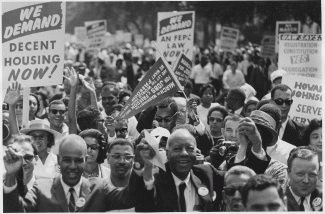By Karl A. Racine
Karl A. Racine is the D.C. Attorney General.
My mother, Marie-Marcelle Buteau Racine, emigrated to the United States in 1963 from Haiti in hopes of creating a better life for our family. She arrived to find a nation struggling to break free of injustice. That year, she joined hundreds of thousands at the Mall for the March on Washington for Jobs and Freedom. It was there, by the reflecting pool, as she added her voice to that collective call for change, that she discovered an abiding love for the United States of America.
Maye, as we called her, died a few weeks ago. As we mark the anniversary of the march, I find myself marveling at the progress she lived through, saddened by all that remains unfinished, yet hopeful that today offers a new inflection point — one paralleling that day at the reflecting pool.
Without question, the march sparked historic shifts. The civil rights movement’s hard-fought battles for equal rights — culminating in the Civil Rights Act of 1964 and the Voting Rights Act of 1965 — made my mother’s hope of a better life for me and my sister possible, as they did for so many other people of color.
For all that changed in American society after 1963, however, the core issue of racism and the inequity it generates remain.
Still today, we witness law enforcement shoot rubber bullets and tear gas at peaceful protesters. Still today, we grieve for unarmed Black people falling victim to extrajudicial killing. Still today, we struggle against shameful efforts to keep people from voting.
Still today, the dream of which the Rev. Martin Luther King Jr. spoke from the steps of the Lincoln Memorial is in many ways still just that: a dream. James Baldwin famously asked how much time America wants for our progress. I believe, as we hear a hunger for change rumbling throughout the country, that the time is now.
Right now, we need a federal government that makes voting easier, not harder, and commits to addressing structural racism. Congress can start by passing the John R. Lewis Voting Rights Act of 2020 and making lynching a federal crime. Another critical way to right these wrongs is to improve data collection. Congress should pass the No Hate Act, which would train law enforcement to accurately report local hate crime data into a national database and establish state-run hate crime hotlines.
As the D.C. attorney general, I know as well as anyone that we need local reforms, too. Our office has led a multistate coalition fighting for returning citizens who face voter suppression and spearheaded a local bill that empowers our office to bring civil action against perpetrators of hate crimes. We need other attorneys general and local officials to match these efforts and use the law to right past wrongs.
Most important, we must continue raising our voices, as my mother did. In November, Americans can choose a government that heeds, rather than ignores, their calls for change. We can throw out state, local and federal elected officials who can’t or won’t work with us to create a new path for America.
The only way we do this is if every eligible voter registers, makes a plan to vote via mail or in person and casts their ballot. Have no doubt: My fellow state attorneys general and I will fight to ensure that every voter is heard and every vote is counted.
In 2017, in her 80s, my mother returned to Washington’s streets, this time for the Women’s March. She marched long into the night with a handwritten sign that read, “Welcome to the New Civil Rights Era.” My mother wrote that sign because she knew that as long as racism and hate persist, our civil rights will remain at stake. She knew that her civic duty demanded she take a stand — and insist on a reckoning.
Maye won’t get to witness where this New Civil Rights Era leads. But we owe it to her and her generation to take up their courageous fight — with our feet, our voices, and our vote — and see to it that progress marches on.

